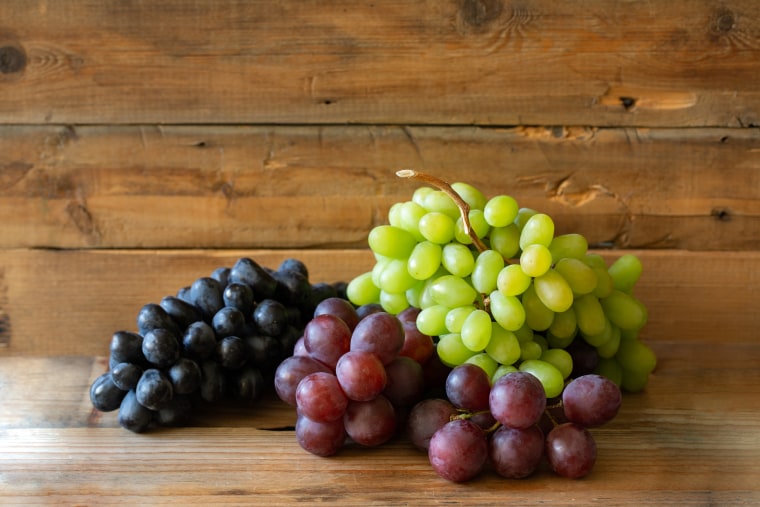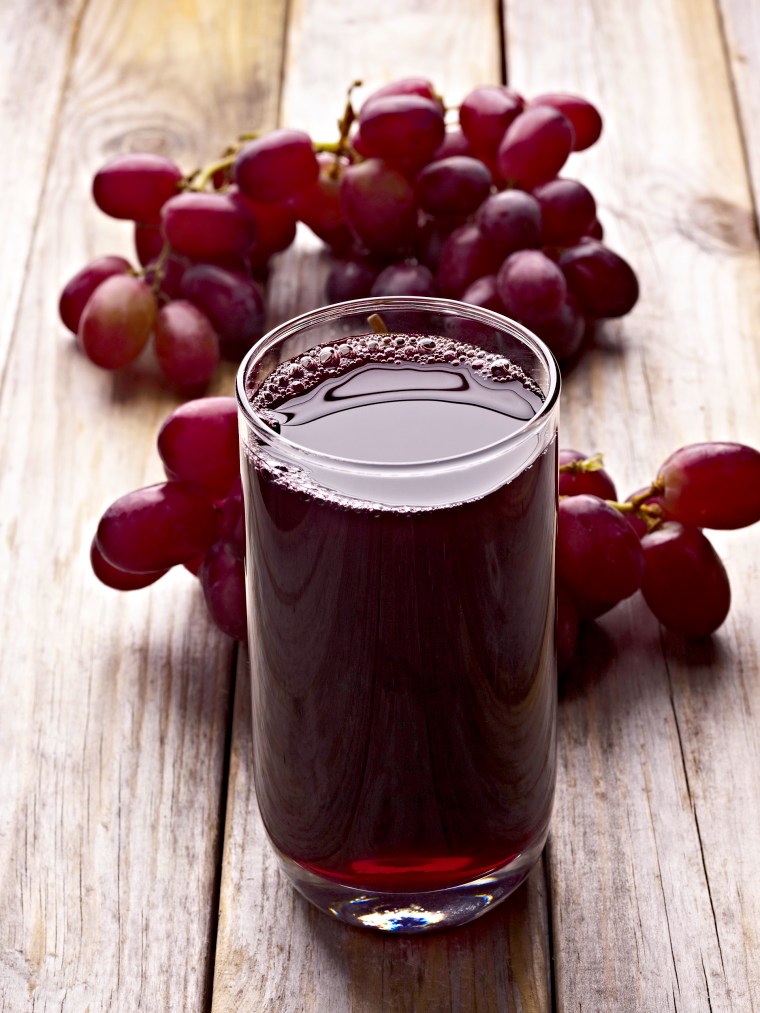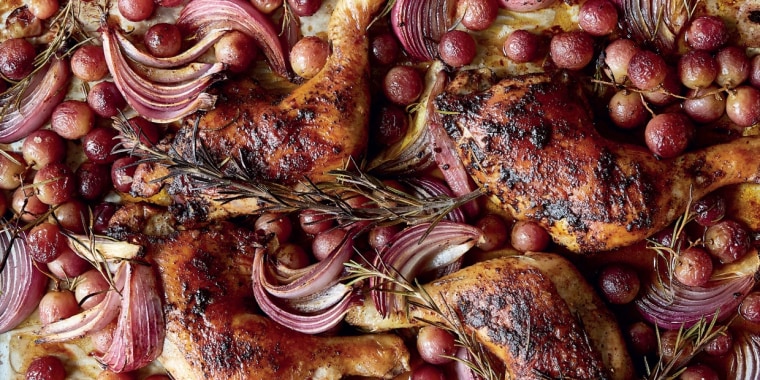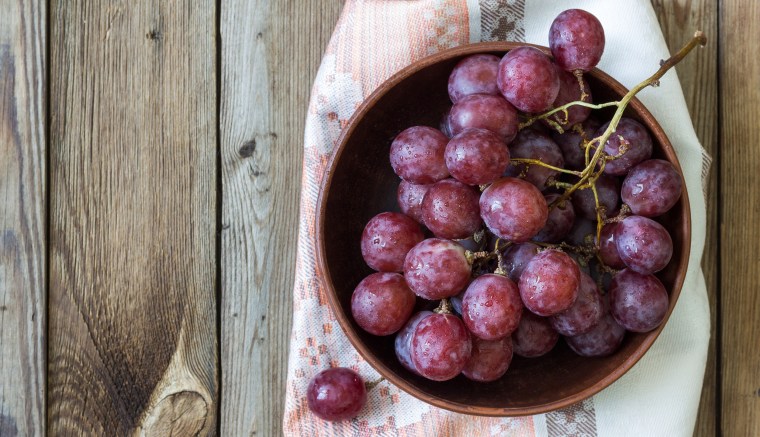Grapes are a sweet treat that date back to about 6000 B.C.. That's right — grapes have been a crowd pleaser for everyday snacking, charcuterie boards, jam, jelly and wine making since Neolithic times. Not only are a grapes versatile fruit, but they also have antioxidants that make them good for your health. As a matter of fact, eating grapes can benefit your heart and skin and maybe even protect against cancer. Let’s look at the wondrous reasons to eat grapes and creative ways to use them.
Grape Nutrition Facts
A ¾ cup serving of grapes has:
● 90 calories
● 0 grams fat
● 23 grams carbohydrates
● 0 grams protein
● 1 gram fiber (4% daily value (DV))
● 22 mcg Vitamin K (25% DV)
Of note, the nutrition facts are identical for red, green and black grapes.

The health benefits of eating grapes
This juicy luscious fruit is most well-known for having polyphenols, or beneficial plant compounds. Red, black and green grapes house polyphenols in the skin, flesh and seeds. Many studies have observed the benefits of polyphenols for healthy aging, and research links eating grapes to reductions in cardiovascular disease risk.
For example, a meta-analysis published in PLOS ONE looked at the effects of grape intake on blood pressure across ten studies. Researchers found that polyphenol intake — via eating grapes daily — lowered systolic blood pressure by over one point. Other studies have determined that consuming one and a quarter cups of grapes per day may improve blood vessel function, as well as reduce blood triglyceride levels, LDL cholesterol levels, and key inflammation markers in the body.
The antioxidant properties of grapes also fight against age-related cognitive deterioration. Research in people with memory decline found that eating a little over two cups of grapes per day preserved activity in regions of the brain associated with Alzheimer’s disease. Additionally, a study conducted on animals suggested that eating grapes may reduce oxidative stress in the brain, which is associated with anxiety and memory decline.
Studies conducted on both animals and humans have also linked grapes to colon and gastrointestinal health. For example, research in mice shows that resveratrol — a specific polyphenol found in grapes — may suppress the replication and promote the death of colon cancer cells. A small five-person study of colon cancer patients found that consuming the equivalent of two and a half cups of grapes for two weeks reduced the expression of genes that promote cancer growth by 47%. Obviously, these results are limited, but they are promising!
Lastly, newer research suggests that grapes may protect the skin against harmful UVB light. Researchers believe that grapes act as an anti-inflammatory agent and increase the activities of proteins that play a role in disposing of cells that contribute to skin cancer.
Are there drawbacks to eating grapes?
There are no downsides for healthy people to eat grapes regularly. People who are on blood thinners may need to avoid grapes, since they are rich in vitamin K, which can decrease the efficacy of the medication.
Fun facts about grapes
You may know that this sweet fruit serves as the precursor to jelly and wine, but did you know these other fun facts?
Grapes are actually a berry
When you think of berries, grapes probably don’t come to mind. But you can put grapes in the same category as blueberries, strawberries, raspberries and blackberries. And like other berries, red and black grapes get their pigment from a compound called anthocyanin, which has been linked to heart health, cancer and diabetes protection.
The skin holds the antioxidants
Grapes contain phytonutrients, which are mostly housed in the skin of the fruit. The most well-known phytonutrient, resveratrol — think red wine — is most concentrated in the skin.
Genetics determine the color of the grape
In 2006, a plant geneticist determined that grapes have different colors because of their genetic makeup. Red, black and green grapes are identical in terms of nutrition facts, but they do have slightly different antioxidants. Whereas dark grapes have anthocyanin, green grapes have flavanols. These differences are minuscule, as all grapes have been shown to be beneficial.
All grapes have a variety of inflammation-fighting antioxidants. But red and black grapes also contain anthocyanin and reservatrol, the plant compounds that have been linked to heart and cognitive health. Therefore, darker grapes have slight edge in the nutrition department, but you can’t go wrong with any grape so choose the one you like best.

What about grape juice?
Although grape juice is rumored to be high in sugar, 100% grape juice is made from only concord grapes, has no added sugar and has been studied extensively for its potential health benefits. As a matter of fact, one hundred percent grape juice contains the beneficial polyphenols that are found in grapes, and research has found a clear relationship between drinking grape juice and reducing cardiovascular disease risk. Plus, a 1/2 cup of 100% grape juice counts as one serving of fruit. Make sure you look for the “100%” on the label to ensure the juice is made from only grapes and has no additives.
Healthy grape recipes
Although grapes are inherently sweet, they pair well with both savory and dessert dishes. Below are some interesting ways to use grapes in your kitchen.

Savory: Add grapes to your main dish in this Roast Chicken with Grapes and Burrata Recipe or Antoni’s Sheet-Pan Chicken with Rosemary and Grapes Recipe. Grapes also pair really well with herbs, like in Giada’s Grape and Rosemary Focaccia Recipe, or with veggies and cheese, like in Roasted Grape and Mascarpone Toast Recipe or Farro Salad with Feta, Brussels Sprouts, Grapes & Almonds. For a sour and sweet snack, try this Pickled Grapes recipe.

Sweet: Pop a bunch of washed grapes in the freezer and enjoy them frozen anytime. Pair grapes with chocolate in this simple Chocolate-Grape Bark or add them to a simple and satisfying White Kiwi Sangria Recipe.
